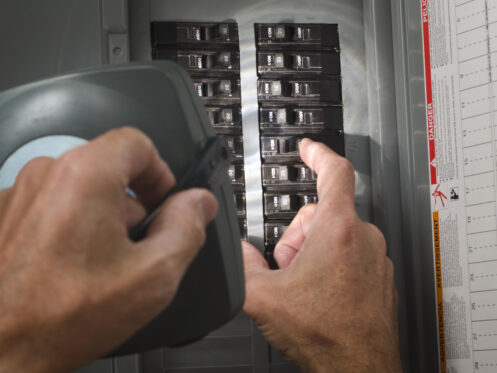The electrical panel is an integral part of your home’s electrical system. All the power that comes into your home runs through it before reaching your outlets and lights. When an electric panel is working well, it ensures your safety, protects appliances and devices, and helps achieve high energy efficiency. When it isn’t, you risk electrical fires, high energy usage, and damage to valuable possessions. Let’s explore the key signs that it’s time to replace your panel.
Outdated Panel
Homeowners should replace outdated electrical panels as soon as possible. One factor is the age of the panel. You likely need one if you live in an older home and have never had a panel replacement. Modern panels can last as long as 50 years with proper maintenance. Still, you want to at least begin considering replacement around 25 years. At that point, panel problems are more likely, and your panel is probably no longer up to code.
Whether or not your panel is code-compliant is another consideration. The National Fire Protection Association updates the National Electrical Code every few years. Consider that the 2023 update added whole-house surge protection as a residential requirement. Most homes built before that year don’t have it. If you want to add that protection, you may be able to update your current panel, or it may be better to replace it.
If you’re still using fuses, that’s a clear sign you need a new panel. You may also want to upgrade your panel proactively to prepare for upcoming home improvements. Many older homes need a new panel or at least upgrades to install:
- Standby generators
- EV charging stations
- Tankless water heaters
- High-power and large appliances
Not Enough Amperage
The current NEC requires no less than 150 amps. Many homes have electrical panels that provide less than that, and even as low as 60 amps. Despite the NEC requirement, many modern households require more than 200 amps. The modern home has many power-hungry devices, including air conditioners, dishwashers, multiple computers, and so forth. If you have less than 150 amps, you likely won’t be able to add any major appliances. In addition, if you tax the system—which is easy to do—you risk overloaded circuits and electrical damage.
Not Enough Space for Additional Breakers
You may need more circuits if you want to add more outlets, lights, and devices. A common problem is never having enough outlets in the rooms you use the most. You may resort to using power strips and extension cords, which usually isn’t a good idea. Adding circuit breakers to a panel is a relatively simple task for an electrician. That said, the panel must have room for them. You need an upgrade if you’re at capacity, which is easy to do with smaller panels.
Rust or Other Corrosion
There should never be any rust or other types of corrosion on an electrical panel. They indicate that there is, or at least was, a moisture problem. You’ll need to identify that issue and correct it. Once you’ve done that, you can then replace the panel. Leaks are an obvious cause of panel rust. The leak may have been behind the wall and gone unnoticed. For extended periods, you can also experience panel corrosion due to elevated humidity levels in a home.
Other Physical Damage
Homeowners should address any physical damage to a panel as soon as possible. Continuing to use the panel risks an electrical fire, appliance damage, and other issues. Damaged breakers may be correctable through replacement. This can also apply to loose and damaged wires. If there are widespread wire issues, bent metal components, cracks, or scorch marks, it’s time to replace the panel.
High Electric Bills
Homeowners should monitor the electric bill and the amount of energy used. If you notice it going up, investigate the reason. If you can’t, schedule a home energy audit for answers. There are many reasons beyond just the panel that a home can become inefficient. Still, a panel can be a notable contributor to excessive power usage. Common examples of when this can occur include:
- Loose connections
- Overloaded circuits
- Damaged circuit breakers
Frequent Circuit Breaker Trips
If a particular circuit breaker trips often, it indicates a problem with that breaker or circuit. Circuit breakers go bad over the years, and wires wear out. You may also have a malfunctioning device connected to the circuit. If you experience frequent trips across an array of breakers, it likely suggests a problem with the panel itself. There may be something wrong with the ground, or perhaps one or more internal components are failing.
Frequent Power Surges
Reoccurring power surges probably aren’t the fault of your electrical panel. Still, your panel should detect them, and the circuit breakers should trip. If that doesn’t occur, you may experience damage to the breakers and other components of the panel. You may know that surges are occurring through other devices. Some surge protectors and many uninterruptible power supplies will alert you. You may also experience damaged or dead surge protectors.
Flickering or Dimming Lights
If your lights dim or flicker isolatedly, this may indicate a problem with the grid. It suggests a problem with your electrical system if it happens multiple times. You may have a loose connection or a wire that needs replacing. The issues may also be due to a failing circuit breaker or corroded terminals on the panel itself. With older panels, it may indicate that the panel is no longer properly distributing the load.
Odd Noises
If you stand next to your panel, you may hear a light hum or buzz. Anything beyond that indicates a problem. You should call an electrician immediately. Even a loud hum is a serious cause for concern. Other sounds that are warning signs include:
- Sizzling
- Clicking
- Rattling
- Popping
- Crackling
Unusual Smells
Your electrical panel shouldn’t make any smell at all. If you notice any, disable power to the panel if you know how and can do so safely. Then, call an electrician. If you can’t disable the panel, call the fire department. A burning smell often accompanies buzzing, indicating a faulty wire or circuit breaker. You may also notice a fishy odor, which often suggests that wire insulation is breaking down.
Upgrade Your Electrical Panel in Chatham
Pipe Works Services has served Chatham, NJ, and the surrounding areas since 2012. Our team performs home energy audits that can help you save money and determine if you need a new electrical panel. We assist our customers with energy rebates and offer maintenance plans that can save you even more money. Our electricians inspect, install, and repair all interior and exterior electrical systems, including standby generators. Our team weatherizes and air-seals homes.
We have HVAC technicians specializing in air conditioners, ductless mini-splits, heat pumps, furnaces, and boilers. Our team installs, repairs, seals, and cleans ducts. We install and service ventilation systems, air purifiers, germicidal lamps, humidifiers, and dehumidifiers. Our plumbers are available for emergency services and perform all manner of installations and repairs, including water heaters, water treatment systems, and sump pumps.
If you have any questions or want to schedule an appointment, contact us today.





